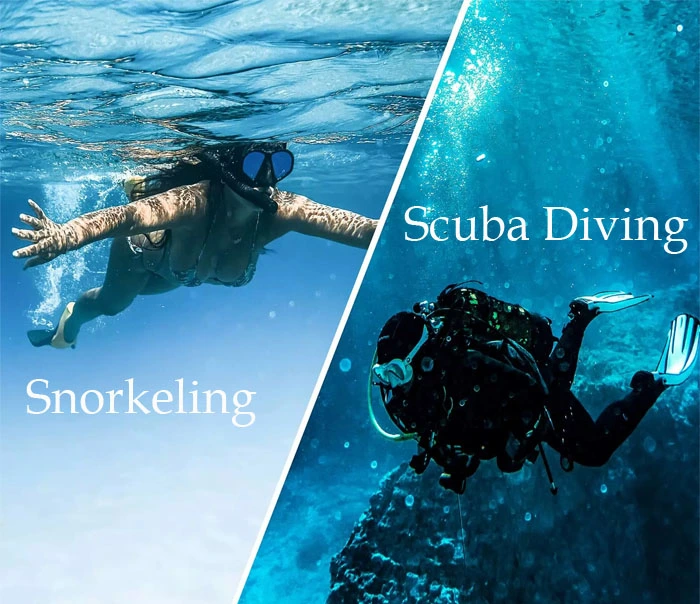Welcome to the ultimate guide to Scuba diving and Snorkeling in the mesmerizing Andaman Islands! If you're an adventure enthusiast, a nature lover, or simply seeking a tropical paradise, the Andaman Islands offer an unparalleled experience. With crystal-clear waters, vibrant coral reefs, and abundant marine life, this archipelago is a dream destination for scuba divers and snorkelers alike. In this comprehensive guide, we'll take you on a virtual tour of the Andaman Islands, revealing the best spots for underwater exploration and sharing valuable tips to make your journey unforgettable.
- Home
- > Blog

Uncover you Venturesome for Scuba Diving and Snorkeling in Andaman Islands
Exploring the Marine Wonders
Scuba Diving: Unveiling the Depths
Descend into the depths of the Andaman Sea and uncover a world brimming with wonder. The Andaman Islands boast a diverse range of dive sites catering to both novice and experienced divers. Havelock Island, Neil Island, and North Bay Island are renowned for their pristine coral reefs, offering a kaleidoscope of colors and shapes. Encounter majestic marine creatures, including sea turtles, manta rays, and even the elusive dugong. Don't miss the opportunity to explore the legendary SS Maheno shipwreck near Henry Lawrence Island, a hauntingly beautiful testament to history.
Snorkeling: A Window to the Submerged Realm
For those who prefer to stay near the surface, snorkeling in the Andaman Islands provides an enchanting experience. Slip on your mask, secure your snorkel, and immerse yourself in a realm of vibrant corals and curious fish. Elephant Beach, Bharatpur Beach, North Bay and Jolly Buoy Island are fantastic snorkeling spots that offer easy access to shallow reefs teeming with marine life. Marvel at the intricate formations of hard and soft corals, spot playful clownfish darting among anemones and witness the graceful movements of parrotfish and butterflyfish.
Insider Tips for an Unforgettable Adventure
The Andaman Islands offer a year-round tropical climate, but the best time to indulge in Scuba diving and Snorkeling is during the dry season, typically from September to May. From June to August, the monsoon season brings rough seas and limited visibility, making it less ideal for underwater activities.
PADI Certification and Training
If you're new to scuba diving, consider obtaining a PADI (Professional Association of Diving Instructors) certification. The Andaman Islands host reputable dive centers that offer comprehensive courses catering to all levels of expertise. By becoming a certified diver, you'll gain the necessary skills and knowledge to fully appreciate the underwater wonders while ensuring your safety throughout your adventures.
Ecotourism and Marine Conservation
Preserving the delicate marine ecosystem of the Andaman Islands is of utmost importance. As responsible visitors, let's prioritize ecotourism and support local initiatives dedicated to marine conservation. Choose eco-friendly dive operators and snorkeling tours that adhere to sustainable practices, such as responsible waste management and protecting coral reefs. By treading lightly, we can help preserve this natural treasure for generations.
Conclusion
The Andaman Islands are a slice of paradise waiting to be explored beneath the azure waters. Whether you're an avid scuba diver or a snorkeling enthusiast, these islands offer an immersive experience like no other. Dive into a world of vibrant corals, encounter mesmerizing marine creatures, and create memories that will last a lifetime.
The visibility in the Andaman Islands is generally excellent, ranging from 15 to 30 meters (50 to 100 feet). However, it can vary depending on the season and specific dive sites.
Most dive centers and snorkeling operators have age restrictions in place. Snorkeling is generally suitable for children above the age of 6, while scuba diving may have a minimum age requirement of 10 to 12 years old, depending on the certification agency.
The Andaman Islands are teeming with marine life. You can encounter a wide variety of species, including vibrant coral formations, reef fish, turtles, rays, sharks, and even larger creatures like dugongs and whales in certain seasons.
Safety should always be a priority. It is essential to follow the instructions of trained dive professionals, practice proper buoyancy control, and never touch or disturb the marine life. Also, ensure you have travel insurance that covers scuba diving and snorkeling activities.
While many dive centers and snorkeling operators provide equipment rentals, bringing your own gear is recommended for a comfortable and personalized experience. However, rental options are available on the islands if you prefer to travel lightly.
